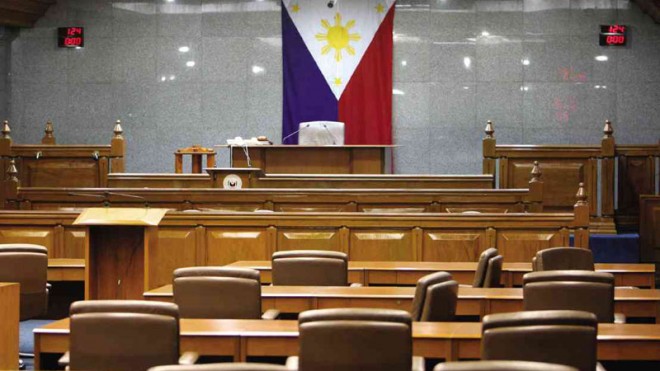19 senators seek to uphold immunity during privilege speech

Senate session hall INQUIRER file photo
Crossing partylines, 19 of 23 senators filed on Wednesday a resolution expressing that the Senate’s absolute parliamentary immunity for speeches delivered in the chamber must be “upheld and protected” at all times.
“The Senate must thwart any attempt to diminish its members’ constitutionally guaranteed right to parliamentary immunity and privilege from arrest as it is only with the fullest liberty of speech that legislators can effectively discharge their mandate,” read the Senate Resolution No. 697.
Only four did not sign the resolution and they were Senate President Aquilino “Koko” Pimentel III, Majority Leader Vicente “Tito’ Sotto III, and Senators Richard Gordon and Francis Escudero, who are all part of the Senate majority bloc.
Thirteen authors of the resolution belong to the majority bloc while six are from the minority bloc.
The 13 majority members are Senate President Pro Tempore Ralph Recto, Senators Sonny Angara, Nancy Binay, JV Ejercito, Sherwin Gatchalian, Gringo Honasan, Panfilo Lacson, Manny Pacquiao, Grace Poe, Joel Villanueva and Juan Miguel Zubiri.
Article continues after this advertisementThe six opposition members are Minority Leader Franklin Drilon, Senators Francis Pangilinan, Bam Aquino, Risa Hontiveros, Antonio Trillanes IV and Leila de Lima, who has been detained at Camp Crame in Quezon City over drug charges.
Article continues after this advertisementThe resolution noted that under Section 11, Article VI of the Constitution guarantees that “A senator or member of the House of Representatives shall, in all offenses punishable by not more than six years imprisonment, be privileged from arrest while the Congress is in session.”
“No member shall be questioned nor be held liable in any other place for any speech or debate in the Congress or in any committee hearings,” the particular section further reads.
Members of Congress, therefore, may not be prosecuted for any words spoken in speech or debate made in the exercise of their functions n during session, whether in their respective chambers, in joint assembly, or in committee hearings, the resolution said.
The purpose of these privileges, it said, was to “ensure” the effective discharge of legislative functions by a member of Congress “free from vindictiveness or form the haunting n fear that its most innocuous expressions may at any time afterwards place him in jeopardy of punishment.”
“Only Congress can take disciplinary action against its members for unparliamentary conduct or disorderly behavior, consistent with the Constitution’s recognition of the legislature’s autonomy, both in the formulation and application of its own rules,” the resolution added. /jpv